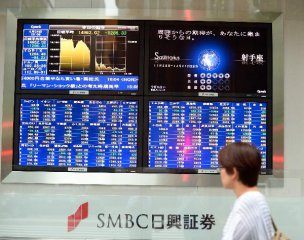
While the Japanese economy continued its momentum of "moderate" expansion with the April-June period growth rate reaching a better-than-expected annualized 4.0 percent, economic analysts here pointed out that the continuous growth still faces a number of challenges.
Though Japan's huge stimulus measures and overall ultra-easy monetary policy have helped the world's third-largest economy to grow theoretically, such policies have a shelf life and such fragile foundations mean that the Japanese economy is still facing risks, challenges and headwinds in the weeks, months and years to come, said analysts.
MONETARY POLICY WANING
Japan's ultra-easy monetary policy over the last four years, the subsequent depreciation of the Japanese yen, coupled with robust exports, are the key reasons for the nation's growth, said Zhu Yan, professor of economics at Takushoku University.
The Bank of Japan (BOJ) has injected massive liquidity into the market by purchasing large amounts of Japanese government bonds since it decided in 2013 to target an inflation rate of 2 percent.
By February 2017, Japan's monetary base had reached 434 trillion yen (3.95 trillion U.S. dollars), 3.8 times of that compared to the end of 2012, and equivalent to some 80 percent of Japan's GDP.
The depreciation of the yen, as a result of the loose monetary policy, boosted the performance of Japanese enterprises, as well as the stock market and the real estate market.
This consequently lifted the income of employees of big corporations and domestic consumption. Corporations also increased investment in research and investment. Hence the recovery of Japan's economy, according to Zhu.
However, with the effects of the monetary policy gradually waning, risks and side effects have become more obvious, according to Zhu and other analysts including Katsuyuki Hasegawa, chief market economist at Mizuho Research Institute.
The risks come from both home and abroad. Domestically, a spate of scandals has plunged Japanese Prime Minister Shinzo Abe's cabinet support rate to below 30 percent at one point, and damaged the political cohesiveness of the government.
Political instability could prevent the government from addressing pressing economic and trade issues and hurt investors' confidence in Japan, according to Hasegawa.
Japan is also facing risks from overseas factors, such as further interests rate hikes from the U.S. Federal Reserve or the European Central Bank, the trend of protectionism in the world, as well as the situation on the Korean Peninsula.
In times of geopolitical tensions or turmoil, investors are quick to switch out of riskier assets like stocks and into safe havens like gold and the yen, analysts said.
This subsequently sees the yen spike against basket of other major currencies, which hurts Japan's key export sector which relies on a weak yen to boost profits when they are repatriated from overseas, they added.
In addition, rising geopolitical tensions can also wreak havoc on the stock market, as investors not switching to safe havens tend to dump stocks or hit the sidelines indefinitely until positive cues are seen.
FRAGILE BALANCE
Another cause of potential risk to the Japanese economy is the huge financial debt of the Japanese government which is like a ticking bomb, according to analysts.
Xing Yuqing, professor at the National Graduate Institute for Policy Studies of Japan, said that in the past four years, the ratio of the Japanese government's public debt to GDP has continued to rise. According to statistics from the Organization for Economic Cooperation and Development (OECD), the public debt of the government currently equals 2.5 times the country's GDP.
Zhu Yan said that Japan copes with the huge financial deficit by issuing large amounts of government bonds, but Japan's excessive amount of currency, rarely seen in Japanese history, is against economic rules.
Despite the "success" in terms of economic expansion, the potential side effects are like a ticking time bomb waiting to go off, said Zhu.
Zhu went on to explain that the reason for Japan being able to maintain its fragile economic balance is that more than 90 percent of the government's bonds were bought by Japanese citizens and companies and the government was able to continue to borrow from the people to pay back old debts without much disturbance from abroad.
However, as the aging of the population accelerates in Japan, citizens' saving rate has been decreasing. If the government debts continue to grow at the current rate, and once the citizens can no longer afford to buy so many government bonds, there will be risks of default.
Zhu said that in an effort to solve the financial deficit, hiking the consumption tax rate has been considered. The Abe administration has raised the consumption tax rate from 5 percent to 8 percent, but the plan to further raise it to 10 percent has been delayed multiple times.
LIMITED POTENTIAL GROWTH
Analysts also pointed out that the deeper risks to the Japanese economy lie in the limits of potential growth due to a labor shortage among other factors.
Zhu Yan pointed out that the labor supply in Japan has seemingly increased in recent years, but it was mainly caused by more elderly people aged above 65 being employed, while the employment situation of people aged below 65 has been worsening.
According to Japan's Ministry of Internal Affairs and Communications, the proportion of the number of families with employees aged above 60 has risen from 11.8 percent in 2001 to 18.8 percent in 2016. While these families also have the least amount of disposable income, a rise in employment figures does not necessarily mean an increase in income or consumption.
Meanwhile, although the government encourages women to work, most women only get a third of their previous salaries when they return to work several years after giving birth to their babies.
Hasegawa said that with the aging population, the government's policy to encourage women and elderly people to work and Japanese corporations' policy to increase investment in robots and mechanization won't help the shortage of labor.
He added that the Japanese people might need to give serious consideration to accepting more immigrants in the future - a time which is rapidly approaching, if not already here.
Analysts here also pointed out that with the aging population and decreasing savings, the worsening capital stock also limits potential growth.
Statistics from Japan's Ministry of Internal Affairs and Communications show that family consumption kept dropping over the past five years, and sluggish consumption leads to Japanese corporations unwilling to invest domestically.
Meanwhile, Japanese corporations are relying more on investing overseas to boost profits, although such investment will not help the labor problem here and will increase government tax revenues, although the corporations will be making more money.
INNOVATION LACKS MOTIVATION
While IT companies develop quickly in the United States, China and other countries, those in Japan seem to have drifted away from the global mainstream. Therefore, new business models rising from the IT sector are unlikely to prosper in the Japanese market, which is now considered to be out of touch.
Hasegawa said that many of the companies in the world with the highest market value of stocks were founded in the past two decades, and they have new business models and provide new services, but Japan still lacks the soil to nurture such enterprises that can continue to innovate and bring vitality to the economy.
According to the Global Innovation Index 2016, Japan ranked 9th in input, but only 24th in output, and its innovation efficiency ranked 65th in the world.
Analysts here believe that the low innovation efficiency was not due to slow development of technology, but a lack of innovation in business models.
Hasegawa said that it is important for Japan to relax the regulations and rules, and increase the fluidity of the labor market, while creating an economic and educational social system that is helpful for innovation.
Meanwhile, analysts have also highlighted the fact that the traditionally successful Japanese manufacturing industry also prevent the younger Japanese enterprises from establishing themselves as new industries, which is impeding the structural reform of the economy.
Hasagawa said that Japan should not just rely on its manufacturing industry, but should develop diversified industries, and in order to speed up the development of the service and IT industry, the old rules that restrict reforms should be changed.




















Latest comments